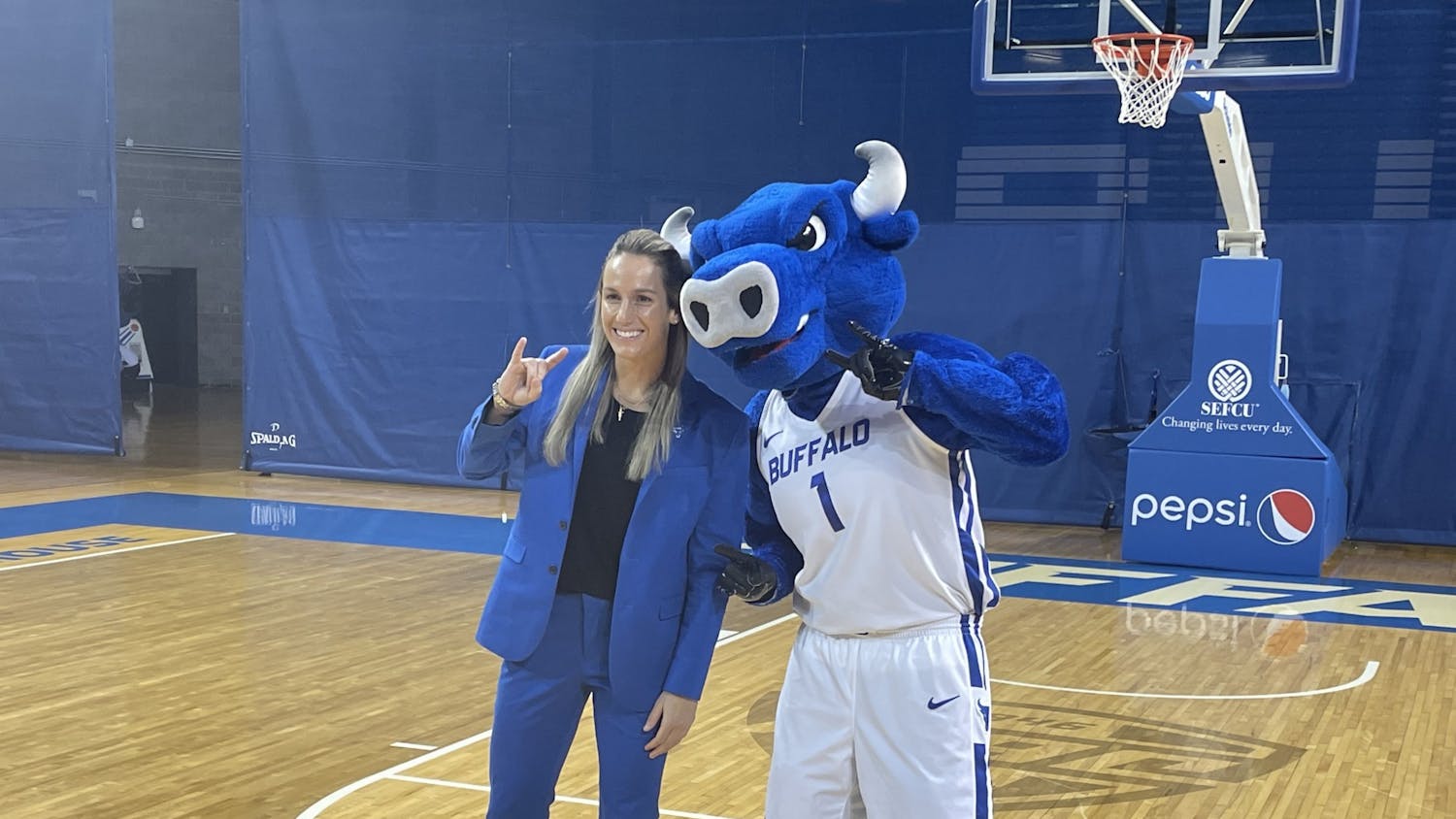Though memorable for playing a frigid Vivian Kensington, Selma Blair showed to be quite the opposite off screen.
The actress and writer has appeared in popular films such as Cruel Intentions and Legally Blonde and has become an advocate for the disability community after being diagnosed with Multiple Sclerosis (MS) in 2018.
Blair closed out the 36th annual Distinguished Speaker Series on Wednesday night. After her appearance on the Center for the Art (CFA) mainstage, a vibrant and animated Blair hopped onto a cushion seat, repositioning herself several times (and almost tipping over the chair in the process) before finally settling with crossed legs.
In an interview with The Spectrum, Blair discussed navigating her healing process in the public eye, finding her voice in Joan Didion, and using her new-found confidence to advocate for herself and others.
This interview has been edited for length and clarity.
The Spectrum: You’ve observed that the press and the public expect celebrities to be the vessel of information for their conditions. Was there any pressure leading up to the moment you publicized your diagnosis that made you hesitant? And how were you able to maintain authority over your own story, while also combating the idea that your experience was not representative of the disabled community?
Selma Blair: The doctor that diagnosed me, he was so kind. But he also said, ‘Don’t tell anyone at work because they’ll think it’ll be an insurance issue.’ So I was scared. But the problem is, I was diagnosed as I was going back to my first day of work after many years of not being employed, so I had to tell the producers because I was really symptomatic. And they were great. I was shocked because my whole life I had been afraid, like, “Oh my god, if they see my bald patch, if they see this.” Forget if they see that I had lesions on my brain and spine. That was the last time I could work because I was just so weak at the time and had to get better. But it is a strange thing, MS (Multiple Sclerosis). They do call it the snowflake disease because it’s just so different [for everyone]. And in everyone there might be unifying factors. But it’s so different. And I realized that from the get go, even as doctors are saying, “You’re not presenting the typical MS case.” And it was always hard not to go back to my bristly place of my youth of being told, like, “Oh, I don’t really believe you.” You know, and I get so nervous. I did when people would say it’s outside the norm, because I just thought, “Oh no, now my credibility will be taken away.” And then that’s the last thing I’d ever want to do for anybody else is to be a spokesperson in any way that would at all make anyone think that I know what I’m talking about for anyone else. I’m fine with nasty things from trolls, but there will be sometimes people just saying, ‘She’s making this all up’ or ‘This is not how I have MS.’ And so to see that, now I don’t think of me anymore, because you really do grow past a stage of caring about that stuff. For all the young girls or boys that have MS or other diseases or conditions that look so different, don’t compare and despair us. But for me, it is hard to have people judge me in my daily life — something that’s just not really true to me, they can draw anything from my picture or whatever. So that does stress me out. That’s the only thing. Like, god, I wish people wouldn’t always think it is so horrible or I’m struggling because I’m really grateful. Sometimes I can get really punchy and forgetful, but I’m just trying my best to just represent myself and the community, not any particular thing.
TS: So we wanted to ask you about Joan Didion [a writer who was diagnosed with MS] since you are a huge admirer of her because of how her words calm you and how you looked to her as an example when you were diagnosed with MS.
SB: Yeah, and she wrote an incredible essay about it, about the stranger at the door, it came for her. She wasn’t actually so symptomatic in her life, but I looked to her. Like, “OK, she has this in her brain, and it worked out well.” There’s so many different avenues and things to take, but I love how she could be so detached from things that made me gooey and unintelligible. No emotion is so paramount in my life, for better or for worse. And I love how Joan captured everything. No, but I really do, I just love her as a writer. I have, always. And sometimes when I feel really down, I think, “Wait, how would Joan narrate this moment? It would be very different from what’s in my head right now.” And I kind of switch it around to something that’s not so veered towards whatever I’m judging it to be.
TS: Did her writing style affect your writing style in your memoir, Mean Baby?
SB: No, because I’m more wound up like Charles Bukowski in my writing, sadly, who just like anything goes and it’s kind of messy. But I do. She’s a goal. She’s such a goal. How clean and almost shocking her writing can be, like it’s in austerity, and then she’ll juxtapose something that just hits to the punctum of it. I just thought she was so brilliant and so spare with the extra Rococo speech. Oh, I’m definitely caught up in Rococo. My mother would say, add it. Take it all down to be Joan. But we cannot be Joan.
TS: In your documentary, which shows your journey with MS, you signal from your brain to your head and you say you are “losing access to my speech from my brain to get it to you.” How did writing help with filling the gaps in your stories that the documentary could not?
SB: It’s so funny how different they were with the documentary, and how much happened in that time. And same with the book, I was writing the book right after stem cells and my brain was not focused. It was way more unfocused than it is now. And both of them, I needed it. I needed that attention in the documentary of having feeling like a support system, even if they were there just to keep a storyline for me in our heads to figure out what I was doing. And I happened to love the director. That’s what I know in my life: performing. Having that documentary to go through the process was such a gift for me. I always say, everyone should have a documentary done about themselves, because you’re so interesting. But the documentary was someone else’s observations of me and my writing was my observations of me until that point. It’s my immature but very deep self at the time, and it helped me get over a lot. It unburdened me and that helped me heal a lot more. And my speech came back. And that’s another thing with MS, I thought it went linear like ALS or something not nearly as urgent as ALS, but I thought once it’s gone,it didn’t come back. And that wasn’t the case with me. A lot of stuff came back. You know, it wasn’t like, “Oh, god, I can’t speak for these two weeks.” But then as soon as I had chemo, I could speak and move, like it must’ve taken some inflammation down. So I feel like nothing is permanent.
TS: You’ve talked about how being enraged about people not listening to women — whether it be about their health conditions or sexual assault — is unproductive. And in this day and age, rage is what people turn to, or they see as a tactic. What makes you say that it’s unproductive?
SB: I mean, one, we all have — like everyone, we hear the cliches but it’s true— that hate, burning inside of the vessel. Whether it’s poor or toxic thinking, that’s just gonna keep me awake at night,we’re all doing the best we can. I’d always wish doctors or people could just think, “OK, if I have no idea and there’s all these neurological symptoms, ‘get a MRI.’” I’m still confounded by it. And I admit this all the time to the doctor, I’m killing myself because I’m hurting and no one believes me. And that was really hard. But I know that there’s just a communication issue. I just didn’t know how to communicate, “No, it’s real.” I would always default back on “Yeah, you’re right. I’m just sad.” And I’d just eat it. And I didn’t even know the possibilities. I’ve grown up with every privilege, and I still had no idea who I was and still wasn’t listened to. I think we have to get into more good trouble. I know when people feel attacked, I mean, it’s just the worst. I’ve done it before in my life. I have a reaction and kind of attack someone and that’s a shutdown. Like, I have just shut them down. I scared them and they scared me, and we’ve gone nowhere. But I don’t have the same rage anymore. Or I just take medicine now that helps me. My doctor called it a pseudobulbar affect, and I was like, “No, it’s kind of my personality.” She’s like, “No, trust me.” So I feel much better now.





